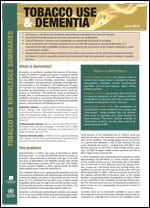Today, the World Health Organization and Alzheimer’s Disease International released the statement below, in conjunction with this Fact Sheet linking tobacco as a risk factor for dementia. New evidence reveals that smokers have a 45% higher risk of developing dementia than non-smokers. 
“This newly-identified link between smoking and dementia provides yet another good reason to quit smoking at any age,” said Laurent Huber, Executive Director of Action on Smoking and Health. “Tobacco kills half of its long term consumers, but this report suggests that even if you are lucky enough to not die prematurely from one of the many diseases caused by tobacco, you might be afflicted by dementia. If we want to increase people’s chances of living long and healthy lives, we need to do everything we can to encourage smokers to quit now.”
This Fact Sheet provides further confirmation that we must implement sound public health measures such as increasing tobacco taxes, banning smoking in public places, banning the advertising of tobacco products, and applying other life saving measures included in the first global public health treaty, the WHO Framework Convention on Tobacco Control.
For an interview with Laurent Huber or Marc Wortmann, Executive Director of Alzheimer Disease International, please contact Megan Arendt (arendtm@ash.org).
FOR IMMEDIATE RELEASE
SMOKING INCREASES RISK OF DEMENTIA
Geneva, 9 July 2014: Smokers have a 45% higher risk of developing dementia than non-smokers, according to information published today by the World Health Organization (WHO) in collaboration with Alzheimer’s Disease International (ADI).
Evidence reviewed by WHO reveals a strong link between smoking and the risk of dementia, and the more a person smokes, the higher the risk. It is estimated that 14% of Alzheimer’s disease cases worldwide are potentially attributable to smoking.
WHO warns that exposure to second-hand smoke (passive smoking) may also increase the risk of dementia.
“Since there is currently no cure for dementia, public health interventions need to focus on prevention by changing modifiable risk factors like smoking,” says Dr Shekhar Saxena, Director of the Department for Mental Health and Substance Abuse at WHO. “This research shows that a decrease in smoking now is likely to result in a substantial decrease in the burden of dementia in the years to come.”
Tobacco use is already recognized as the one risk factor common to four main groups of non-communicable diseases (NCDs): cancers, cardiovascular disease, chronic lung disease and diabetes.
“Tobacco is one of the biggest public health threats the world has ever faced, killing nearly six million people a year,” says Dr Douglas Bettcher, Director of the Department for Prevention of Noncommunicable Diseases at WHO. “WHO urges governments to actively implement and enforce the measures of the WHO Framework Convention on Tobacco Control, especially smoke-free environment laws and access to tobacco cessation services”.
Laurent Huber, Director of the Framework Convention Alliance (FCA) for Tobacco Control, comments: “It is no surprise to see these findings confirm that tobacco smoking is a major risk factor for dementia. This adds yet another item to the long list of the devastating consequences of tobacco and gives even more reason for personal and public health action to help people to quit smoking.”
“The research also shows that quitting smoking later in life might be beneficial so encouraging and supporting current tobacco users to quit should be a priority,” says Serge Gauthier, chair of the ADI’s Medical Scientific Advisory Committee.
Dementia affects more than 44 million people worldwide, with almost two thirds of them living in low- and middle-income countries.
“Every year, there are 7.7 million new cases of dementia. In 2010, the global cost was calculated at US$ 604 billion, which represents 1% of global GDP (gross domestic product),” says Marc Wortmann, ADI Executive Director. “No government can ignore the opportunity to link this new information into its planning and health system activities to reduce smoking and control NCDs.”
ADI believes that this information brief can form the basis for countries to add messages about brain health and dementia risk into public health anti-smoking programs and interventions.
For more information visit: https://www.who.int/tobacco/publications/en/
– End –
About Alzheimer’s Disease International
ADI is the international federation of 84 Alzheimer associations throughout the world. Each of our members is a non-profit Alzheimer association supporting people with dementia and their families. ADI was founded in 1984 and registered as a non-profit organisation in the USA. Based in London, ADI has been in official relations with the WHO since 1996 and has had consultative status with the UN since 2012.
ADI’s vision is an improved quality of life for people with dementia and their families throughout the world. ADI believes that the key to winning the fight against dementia lies in a unique combination of global solutions and local knowledge. As such, it works locally, by empowering Alzheimer associations to promote and offer care and support for people with dementia and their family carers, while working globally to focus attention on dementia and campaign for policy change from governments.
For more information, visit www.alz.co.uk
About the World Health Organization
WHO is the directing and coordinating authority for health within the United Nations system. It is responsible for providing leadership on global health matters, shaping the health research agenda, setting norms and standards, articulating evidence-based policy options, providing technical support to countries and monitoring and assessing health trends.
For more information, visit www.who.int
Update: Broken links removed April 2023








